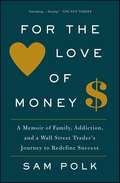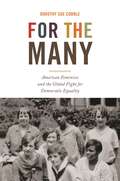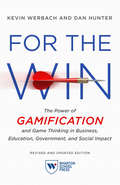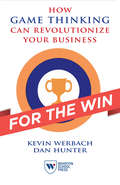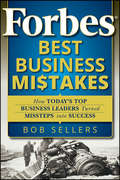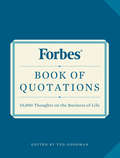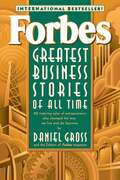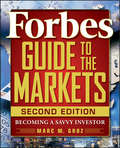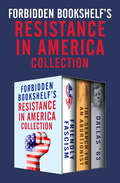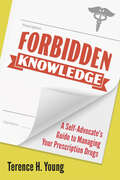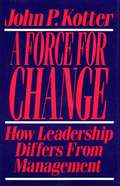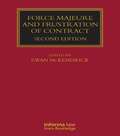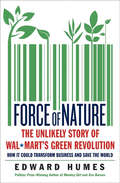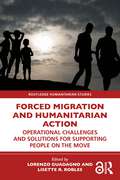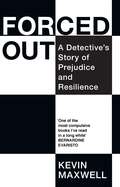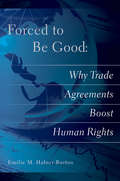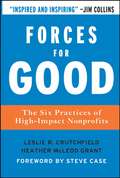- Table View
- List View
For the Love of Money: A Memoir
by Sam PolkIn 2014, a former hedge fund trader's New York Times Sunday Review front page article about wealth addicition instantly went viral. This is his unflinching memoir about coming of age on Wall Street, fighting to overcome the ghosts of his past--and the radical new way he now defines success.At just thirty years old, Sam Polk was a senior trader for one of the biggest hedge funds on Wall Street, on the verge of making it to the very top. When he was offered an annual bonus of $3.75 million, he grew angry because it was not enough. In that moment he knew he had lost himself in his obsessive pursuit of money. And he had come to loathe the culture--the shallowness, the sexism, the crude machismo--and Wall Street's use of wealth as the sole measure of a person's worth. He decided to walk away from it all. For Polk, becoming a Wall Street trader was the fulfillment of his dreams. But in reality it was just the culmination of a life of addictive and self-destructive behaviors, from overeating, to bulimia, to alcohol and drug abuse. His obsessive pursuit of money papered over years of insecurity and emotional abuse. Making money was just the latest attempt to fill the void left by his narcisstic and emotionally unavailable father. As in Liar's Poker, Polk brings readers into the rarefied world of Wall Street trading floors, capturing the modern frustrations of young graduates drawn to Wall Street. Raw, vivid, and immensely readable, For the Love of Money explores the birth of a young hedge fund trader, his disillusionment, and the radical new way he has come to define success.
For the Many: American Feminists and the Global Fight for Democratic Equality (America in the World #56)
by Dorothy Sue CobbleA history of the twentieth-century feminists who fought for the rights of women, workers, and the poor, both in the United States and abroadFor the Many presents an inspiring look at how US women and their global allies pushed the nation and the world toward justice and greater equality for all. Reclaiming social democracy as one of the central threads of American feminism, Dorothy Sue Cobble offers a bold rewriting of twentieth-century feminist history and documents how forces, peoples, and ideas worldwide shaped American politics. Cobble follows egalitarian women’s activism from the explosion of democracy movements before World War I to the establishment of the New Deal, through the upheavals in rights and social citizenship at midcentury, to the reassertion of conservatism and the revival of female-led movements today.Cobble brings to life the women who crossed borders of class, race, and nation to build grassroots campaigns, found international institutions, and enact policies dedicated to raising standards of life for everyone. Readers encounter famous figures, including Eleanor Roosevelt, Frances Perkins, and Mary McLeod Bethune, together with less well-known leaders, such as Rose Schneiderman, Maida Springer Kemp, and Esther Peterson. Multiple generations partnered to expand social and economic rights, and despite setbacks, the fight for the many persists, as twenty-first-century activists urgently demand a more caring, inclusive world.Putting women at the center of US political history, For the Many reveals the powerful currents of democratic equality that spurred American feminists to seek a better life for all.
For the Record: From Wall Street to Washington
by Donald T. ReganThis is a deep and informative study of the inner workings of the Reagan White House, and is based on the thorough notes by the author while he was in the administration.
For the Win, Revised and Updated Edition: The Power of Gamification and Game Thinking in Business, Education, Government, and Social Impact
by Dan Hunter Kevin Werbach“A QUICK BUT THOUGHTFUL LOOK INTO THE PROS AND CONS OF GAMIFICATION….”—Daniel H. Pink, Author, DriveWhy can’t life—and business—be fun?For thousands of years, we’ve created things called games that tap the tremendous psychic power of fun. In a revised and updated edition of For the Win: The Power of Gamification and Game Thinking in Business, Education, Government, and Social Impact, authors Kevin Werbach and Dan Hunter argue that applying the lessons of gamification could change your business, the way you learn or teach, and even your life. Werbach and Hunter explain how games can be used as a valuable tool to address serious pursuits like marketing, productivity enhancement, education, innovation, customer engagement, human resources, and sustainability. They reveal how, why, and when gamification works—and what not to do. Discover the successes—and failures—of organizations that are using gamification:How a South Korean company called Neofect is using gamification to help people recover from strokes;How a tool called SuperBetter has demonstrated significant results treating depression, concussion symptoms, and the mental health harms of the COVID-19 pandemic through game thinking; How the ride-hailing giant Uber once used gamification to influence their drivers to work longer hours than they otherwise wanted to, causing swift backlash.The story of gamification isn’t fun and games by any means. It’s serious. When used carefully and thoughtfully, gamification produces great outcomes for users, in ways that are hard to replicate through other methods. Other times, companies misuse the “guided missile” of gamification to have people work and do things in ways that are against their self-interest. This revised and updated edition incorporates the most prominent research findings to provide a comprehensive gamification playbook for the real world.
For the Win: How Game Thinking Can Revolutionize Your Business
by Dan Hunter Kevin WerbachTake your business to the next level-for the winMillions flock to their computers, consoles, mobile phones, tablets, and social networks each day to play World of Warcraft, Farmville, Scrabble, and countless other games, generating billions in sales each year. The careful and skillful construction of these games is built on decades of research into human motivation and psychology: A well-designed game goes right to the motivational heart of the human psyche.In For the Win, authors Kevin Werbach and Dan Hunter argue persuasively that gamemakers need not be the only ones benefiting from game design. Werbach and Hunter are lawyers and World of Warcraft players who created the world's first course on gamification at the Wharton School. In their book, they reveal how game thinking-addressing problems like a game designer-can motivate employees and customers and create engaging experiences that can transform your business.For the Win reveals how a wide range of companies are successfully using game thinking. It also offers an explanation of when gamifying makes the most sense and a 6-step framework for using games for marketing, productivity enhancement, innovation, employee motivation, customer engagement, and more.In this illuminating guide, Werbach and Hunter reveal how game thinking can yield winning solutions to real-world business problems. Let the games begin!
For-Profit Higher Education: University of Phoenix
by Gwen Yu Christopher F. Noe Joseph Weber Judy MclellanCase
Forbes Best Business Mistakes
by Bob SellersToday's top business leaders reveal how to make even the biggest mistakes work for you Forbes Best Business Mistakes reveals practical lessons from some of today's most successful business leaders to show you how to turn a bad business situation into a success. Based on exclusive sit-down interviews with some of today's most successful men and women, author Bob Sellers shares their stories to provide valuable insights and lessons that can help you can learn from their mistakes. Those profiled in Forbes Best Business Mistakes include the likes of Wall Street guru Peter Lynch, larger-than-life media personalities Jim Cramer and Suze Orman, legendary CEO Jack Welch, and newcomer Jason Kilar, CEO of Hulu, who is poised to change the movie and TV industry landscape as we know it forever. Other names include PIMCO's Bill Gross and Mohamed El-Erian and Home Depot Founder Arthur Blank. Reveal how top business and financial leaders turned their biggest mistakes into success stories Based on exclusive interviews with some of today's most successful professionals, from Jason Kilar of Hulu to Suze Orman Contains practical lessons on how you can turn a bad business situation around As Malcolm Forbes put it, "Failure is success if we learn from it. " Forbes Best Business Mistakes shares the missteps of others so you can learn from them, be inspired by them, and succeed where you may not have seen opportunity before.
Forbes Book of Quotations: 10,000 Thoughts on the Business of Life
by Ted GoodmanRevised and updated, this bestselling collection of business wit and wisdom is the ultimate desk reference for the cube and corner office, by one of the world's most popular business publications. Forbes is one of the world's most trusted, recognizable, and growing brands in business news and information both in print and online. This comprehensive collection of business quotations gathers more than 10,000 apt, astute, and motivational remarks on scores of topics, organized alphabetically, from "Ability" to "Excellence" to "Salesmanship. " Originally published by Black Dog & Leventhal in 1997, this new edition is updated with hundreds of new quotations, from the likes of Steve Jobs Sheryl Sandberg, and Oprah Winfrey that pertain to modern business culture. Forbes Book of Quotations is the perfect gift or reference tool for students, budding entrepreneurs, and seasoned professionals alike, or anyone looking for a sharp-witted way to make a lasting impression. Forbes® documents and promotes innovation, leadership, politics, entertainment, technologies, culture, business, and style. Since 1917, Forbes magazine and Forbes. com have provided the world's business leaders with strategic insight and information. Ted Goodman is General Editor of the Avery Index to Architectural Periodicals. He lives in New York City.
Forbes Greatest Business Stories of All Time
by Daniel GrossWhat do Bill Gates, Henry Ford, J. P. Morgan, Mary Kay Ash, and Walt Disney all have in common? Uncompromising vision, a willingness to take risks, and exceptional business acumen. Not only did these individuals amass great fortunes, they revolutionized the business world and helped shape society as we know it. Theirs are just a few of the stories collected in this anthology of commercial ingenuity. Drawing on a wealth of sources, this priceless collection brings to life extraordinary achievements, many of them forgotten or little known: how Robert Morris, the preeminent merchant of the eighteenth century, financed the American Revolution with his personal credit; how Ray Kroc used a shrewd real estate strategy to turn a faltering hamburger franchise operation into the McDonald's fast food empire; and how Mary Kay Ash built a billion-dollar direct sales cosmetics company by preaching a message of economic empowerment to women. Enlightening and fascinating, Forbes(r) Greatest Business Stories of All Time celebrates larger-than-life ambition, inspired leadership, wheeling and dealing, and hard work. Forbes is a registered trademark of Forbes Inc. Its use is pursuant to a license agreement with Forbes Inc.
Forbes Guide to the Markets
by Forbes Llc Marc M. GrozFrom the leader in financial information, a fully updated guide to investing in today's marketsThis accessible book is a practical guide to the financial markets. Designed to help both the new and experienced investor gain sufficient understanding and knowledge to invest wisely and confidently in today's turbulent markets, it covers all the elements necessary to become financially street smart-from products, players, and procedures to rules, regulators, and risk/reward trade-offs.Filled with solid investment principles, the Forbes Guide to the Markets, Second Edition is completely revised and updated to reflect new trends and changes in the markets.New topics discussed include the introduction and implementation of ETFs, the role of hedge funds, and the effects of the subprime crisisUpdated and revised chapters contain buying and selling techniques, fundamental, technical and quantitative analysis, and futures and options informationHighlights key terms and contains a complete glossaryAn essential resource for both the new or seasoned investor, this authoritative resource is a must-read for anyone aspiring to become a savvy investor.
Forbidden Bookshelf's Resistance in America Collection: Friendly Fascism, The Search for an Abortionist, and Dallas '63 (Forbidden Bookshelf)
by Peter Dale Scott Nancy Howell Lee Bertram GrossFrom creeping capitalism to abortion to government corruption, these three books shed light on controversial topics that are too often left in the dark. Curated by NYU professor Mark Crispin Miller, the Forbidden Bookshelf series resurrects books from America&’s repressed history. All touching on bold and debated topics, these three books are more relevant today than ever. Friendly Fascism: Bertram Gross, a presidential adviser in the New Deal era, explores the insidious way that capitalist politics could subvert America&’s constitutional democracy. First published over three decades ago, this book predicted the threats and realities that occur when big business and big government become bedfellows, while demonstrating how US citizens can build a truer democracy. The Search for an Abortionist: Nancy Howell Lee&’s eye-opening account reveals the dangerous and illegal options for women seeking an abortion before Roe v. Wade. Based on interviews with 114 women, this groundbreaking work takes an intimate look at the abortion process. Dallas &’63: Peter Dale Scott exposes the deep state, an intricate network within the American government, linking Wall Street influence, corrupt bureaucracy, and the military-industrial complex. Since World War II, its power has grown unchecked, and nowhere has it been more apparent than at Dealey Plaza on November 22, 1963. Scott details the CIA and FBI&’s involvement in the JFK assassination, and shows how events like Watergate, the Iran–Contra affair, and 9/11 are all connected to this behind-the-scenes web of corruption.
Forbidden Knowledge: A Self-Advocate's Guide to Managing Your Prescription Drugs
by Terence H. YoungTerence Young exposes the pharmaceutical industry secrets and cultural myths that thwart our safe use of prescription drugs.… Everyone should read it before their next visit to a doctor. — DR. NANCY OLIVIERI, MD, physician and professor When it comes to drug safety, Big Pharma holds all the power, and it’s time for patients to take it back.Tens of millions of patients in North America take prescription drugs, but the safety of these drugs is often based on medical myths. We are led to believe that if a medication isn’t safe, the government would never allow it on the market and that doctors would never prescribe a drug that isn’t proven effective. Who controls these narratives? And do they always have the best interests of patients in mind?In an in-depth study of the enormous influence the pharmaceutical industry has over our health, drug safety advocate Terence Young explores how those with the most to gain financially are also those who wield all the power in health care — and withhold the knowledge that is critical to the safety of patients.Forbidden Knowledge reveals the truth you need to know about prescription drugs and what to do about it. It will empower you to partner with your doctor to talk openly and plainly about medications to help avoid serious adverse drug reactions. This is your survival guide to Big Pharma.
Force For Change
by John P. KotterThe critics who despair of the coming of imaginative, charismatic leaders to replace the so-called manipulative caretakers of American corporations don't tell us much about what leadership actually is, or, for that matter, what management is either. Now, John P. Kotter, who focused on why we have a leadership crisis in The Leadership Factor shows here, with compelling evidence, what leadership really means today, why it is rarely associated with larger-than-life charismatics, precisely how it is different from management, and yet why both good leadership and management are essential for business success, especially for complex organizations operating in changing environments. Leadership, Kotter clearly demonstrates, is for the most part not a god-like figure transforming subordinates into superhumans, but is in fact a process that creates change -- a process which often involves hundreds or even thousands of "little acts of leadership" orchestrated by people who have the profound insight to realize this. Building on his landmark study of 15 successful general managers, Kotter presents detailed accounts of how senior and middle managers in major corporations, in close concert with colleagues and subordinates, were able to create a leadership process that put into action hundreds of commonsense ideas and procedures that, in combination with competent management, produced extraordinary results. This leadership turned NCR from a loser to a big winner in automated teller machines, despite intense competition from IBM. The same process at American Express and SAS helped businesses grow dramatically despite the fact that they were "mature" and "commodity-like." Kotter also shows how leadership turned around operations at P&G and Kodak; produced huge business successes at PepsiCo, ARCO, and ConAgra; and made the impossible occasionally happen at Digital. Thousands of companies today are overmanaged and underled, John Kotter concludes, not because managers lack charisma, but because far too few executives have a clear understanding of what leadership is and what it can accomplish. Without such a vision, even the most capable people have great difficulty trying to lead effectively and to create the cultures which will help others to lead.
Force Majeure and Frustration of Contract (Lloyd's Commercial Law Library)
by Ewan McKendrickThis updated edition includes an examination of force majeure in French law, the drafting of force majeure clauses, its usage in shipbuilding contracts, and the application of commercial impracticality under article 2-165 of the Uniform Commercial Code.
Force and Motion Engineering Internship, Engineering Notebook with Article Compilation
by Lawrence Hall of ScienceHow can you get critical supplies to people in need after a natural disaster? If you drop a pod of supplies, what pod materials and features will make safe and successful delivery of food and medical supplies? That’s what you will figure out as you and your classmates take on the role of mechanical engineering interns with Futura Engineering, a company that specializes in designing solutions for the world’s problems. As an intern, you will work to apply your knowledge of forces and motion to help design a pod that will deliver emergency aid packages to people in remote areas where disasters such as earthquakes, landslides, or floods have made it dangerous or impossible to deliver aid by trucks. You will design and test your pod using a digital tool called SupplyDrop, and consider different design aspects: the pod’s shell material, the type and amount of internal padding, and whether you will add additional external features like a parachute or landing legs to your pod. Your supply pod design must protect the cargo by minimizing damage to supplies, offer possibilities for reusing the pod’s shell for shelter, and be as low-cost as possible.
Force of NatureThe Unlikely Story of WalMart's Green Revolution: The Unlikely Story of Wal-Mart's Green Revolution
by Edward HumesWhat happens when a renowned river guide teams up with the CEO of one of the largest and least Earth-friendly corporations in the world? When it's former Wal-Mart CEO H. Lee Scott and white-water expert turned sustainability consultant Jib Ellison, the result is nothing less than a green business revolution. Wal-Mart-long the target of local businesses, labor advocates, and environmentalists who deplore its outsourced, big-box methods-has embraced an unprecedented green makeover, which is now spreading worldwide. The retail giant that rose from Sam Walton's Ozarks dime store is leveraging the power of 200 million weekly customers to drive waste, toxics, and carbon emissions out of its stores and products. Neither an act of charity nor an empty greenwash, Wal-Mart's green move reflects its river guide's simple, compelling philosophy: that the most sustainable, clean, energy-efficient, and waste-free company will beat its competitors every time. Not just in some distant, utopian future but today. From energy conservation, recycling, and hybrid trucks to reduced packaging and partnerships with environmentalists it once met only in court, Wal-Mart has used sustainability to boost its bottom line even in a tough economy-belying the age-old claim that going green kills jobs and profits. Now the global apparel business, the American dairy industry, big agriculture, and even Wall Street are following Wal-Mart's lead, along with the 100,000 manufacturers whose products must become more sustainable to remain on Wal-Mart's shelves. Here Pulitzer Prize winner and bestselling author Edward Humes charts the course of this unlikely second industrial revolution, in which corporate titans who once believed profit and planet must be at odds are learning that the best business just may be a force of nature.
Force, Motion, and Work: Module K
by Leonard Bernstein Martin Schachter Alan Winkler Stanley WofeScience textbook
Forced Distribution: Assess Performance More Effectively
by Dick GroteTo drive rigor and truth into performance appraisal assessments and discussions, many organizations employ a technique called "forced distribution," the setting of maximums and minimums in performance appraisal ratings to ensure that there is differentiation.
Forced Migration and Humanitarian Action: Operational Challenges and Solutions for Supporting People on the Move (Routledge Humanitarian Studies)
by Lorenzo Guadagno Lisette R. RoblesForced population movements are a defining feature of almost any humanitarian crisis, shaping the design, targeting, and delivery of emergency responses.This book investigates how the evolving situation of different forced migrants is accounted for and addressed in humanitarian action in order to improve their access to support and assistance. Bringing together case studies from Africa, Asia, Europe, and the Pacific, this book focuses on a diversity of operational modalities and types of assistance provided by both traditional and non-traditional humanitarian actors to address the specific needs of displaced children, women, people with disabilities and older people, as well as trafficked migrant workers.This book adopts a broad perspective on humanitarian action, acknowledging how its boundaries are challenged and expanded in forced migration contexts. Its operational and theoretical insights will be useful for a range of readers, from humanitarian and migration researchers and students to practitioners and policymakers.
Forced Out: A Detective's Story of Prejudice and Resilience
by Kevin MaxwellA gay, black, British police officer&’s memoir of prejudice, racism and homophobia on the force in the twenty-first century.Kevin Maxwell was a dream candidate for the police force—he had a long-held desire to serve his community, a strong moral compass and a clear aptitude for both the strategic and practical aspects of policing. And, as a gay black man from a working-class family, he could easily have been a poster boy for the force&’s stated commitment to equal opportunities. Joining just after the 9/11 attacks, Kevin entered policing determined to keep communities safe in the face of a changing world. But instead, he came up against entrenched prejudice, open racism and homophobia. For more than ten years, Kevin strove against the odds, until he took the force to an employment tribunal—with devastating results.Forced Out is a revelatory exposé combining deeply affecting memoir with sharp analysis and a fascinating insider perspective on day-to-day life in the force. It is a touchstone for the silent many who have either tried to ignore abuse for the sake of their career or who have been bullied out of their jobs. It paints a sobering portrait of an institution that has not yet learned the lessons of the past and whose prejudice is informing the cases it chooses to investigate and the way it investigates them. And it asks the important question: what needs to change?&“One of the most compulsive books I&’ve read in a long while.&” –Bernadine Evaristo, award-winning author of Girl, Woman, Other
Forced Ranking and the Law
by Dick GroteThis chapter outlines the legal issues that employers should be conscious of when implementing or applying a forced ranking system.
Forced Ranking-Behind the Scenes
by Dick GroteIn this chapter, the author shows readers how a large-scale forced ranking system was created at a major corporation, describing actual ranking sessions that were conducted.
Forced To Be Good: Why Trade Agreements Boost Human Rights
by Emilie M. Hafner-BurtonPreferential trade agreements have become common ways to protect or restrict access to national markets in products and services. The United States has signed trade agreements with almost two dozen countries as close as Mexico and Canada and as distant as Morocco and Australia. The European Union has done the same. In addition to addressing economic issues, these agreements also regulate the protection of human rights. In Forced to Be Good, Emilie M. Hafner-Burton tells the story of the politics of such agreements and of the ways in which governments pursue market integration policies that advance their own political interests, including human rights. How and why do global norms for social justice become international regulations linked to seemingly unrelated issues, such as trade? Hafner-Burton finds that the process has been unconventional. Efforts by human rights advocates and labor unions to spread human rights ideals, for example, do not explain why American and European governments employ preferential trade agreements to protect human rights. Instead, most of the regulations protecting human rights are codified in global moral principles and laws only because they serve policymakers' interests in accumulating power or resources or solving other problems. Otherwise, demands by moral advocates are tossed aside. And, as Hafner-Burton shows, even the inclusion of human rights protections in trade agreements is no guarantee of real change, because many of the governments that sign on to fair trade regulations oppose such protections and do not intend to force their implementation. Ultimately, Hafner-Burton finds that, despite the difficulty of enforcing good regulations and the less-than-noble motives for including them, trade agreements that include human rights provisions have made a positive difference in the lives of some of the people they are intended-on paper, at least-to protect.
Forces Driving Inflation in the New EU10 Members
by Emil StavrevA report from the International Monetary Fund.
Forces for Good
by Leslie Crutchfield Grant Heather McleodAn innovative guide to how great nonprofits achieve extraordinary social impact. What makes great nonprofits great? Authors Crutchfield and McLeod Grant searched for the answer over several years, employing a rigorous research methodology which derived from books on for-profits like Built to Last. They studied 12 nonprofits that have achieved extraordinary levels of impact-from Habitat for Humanity to the Heritage Foundation-and distilled six counterintuitive practices that these organizations use to change the world. This book has lessons for all readers interested in creating significant social change, including nonprofit managers, donors and volunteers. Leslie R. Crutchfield (Washington, D. C. ) is a managing director of Ashoka and research grantee of the Aspen Institute. Heather McLeod Grant (Palo Alto, CA) is a nonprofit consultant and advisor to Duke University's Center for the Advancement of Social Entrepreneurship and the Stanford Center for Social Innovation. Crutchfield and Grant were co-founding editors of Who Cares, a national magazine reaching 50,000 readers in circulation between 1993-2000.
